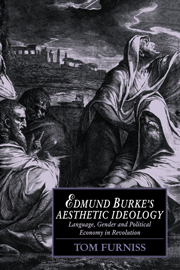Book contents
- Frontmatter
- Contents
- Acknowledgements
- Note on texts
- Introduction
- PART ONE AESTHETICS FOR A BOURGEOIS REVOLUTION
- PART TWO REFLECTIONS ON A RADICAL REVOLUTION
- 5 The genesis of the Reflections: resisting the irresistible voice of the multitude
- 6 Stripping the queen: Edmund Burke's magic lantern show
- 7 A revolution in manners: chivalry and political economy
- 8 Reform and revolution
- 9 Imaginary constitutions and economies
- 10 Speculation and the republic of letters
- Notes
- Index
6 - Stripping the queen: Edmund Burke's magic lantern show
Published online by Cambridge University Press: 18 February 2010
- Frontmatter
- Contents
- Acknowledgements
- Note on texts
- Introduction
- PART ONE AESTHETICS FOR A BOURGEOIS REVOLUTION
- PART TWO REFLECTIONS ON A RADICAL REVOLUTION
- 5 The genesis of the Reflections: resisting the irresistible voice of the multitude
- 6 Stripping the queen: Edmund Burke's magic lantern show
- 7 A revolution in manners: chivalry and political economy
- 8 Reform and revolution
- 9 Imaginary constitutions and economies
- 10 Speculation and the republic of letters
- Notes
- Index
Summary
We have seen that Burke's hostility towards the French Revolution was primarily aroused not by the events of the Revolution themselves but by reading Price's sermon in January 1790. Burke's response to the events at Versailles on 5–6 October 1789, which forms the central scene in the Reflections, was therefore a belated one. It was primarily triggered, I suggest, not by the events themselves but by the way Price appeared to represent them as the heroic climax of the people's struggle for liberty in which they led their king ‘in triumph’. In order to facilitate the following discussion of Burke's version of the events at Versailles, I quote from Alfred Cobban's vivid account of them:
On 5 October women gathered before the Hotel de Ville demanding bread: this was quite normal. Getting no satisfaction the cry was raised – by whom? – that they should make their way to Versailles to appeal to the king. Several thousands set out, gathering numbers as they went … At four o'clock in the afternoon the Municipal Council authorized La Fayette to move off with the National Guard, and now there appeared for the first time a definite objective: the king was to be brought back to Paris. With a mixed body of National Guards and others La Fayette set out … That evening the main body of the Parisians arrived, settled down for the night as best they could or ranged about the streets of Versailles and the courts of the palace. […]
- Type
- Chapter
- Information
- Edmund Burke's Aesthetic IdeologyLanguage, Gender and Political Economy in Revolution, pp. 138 - 163Publisher: Cambridge University PressPrint publication year: 1993



